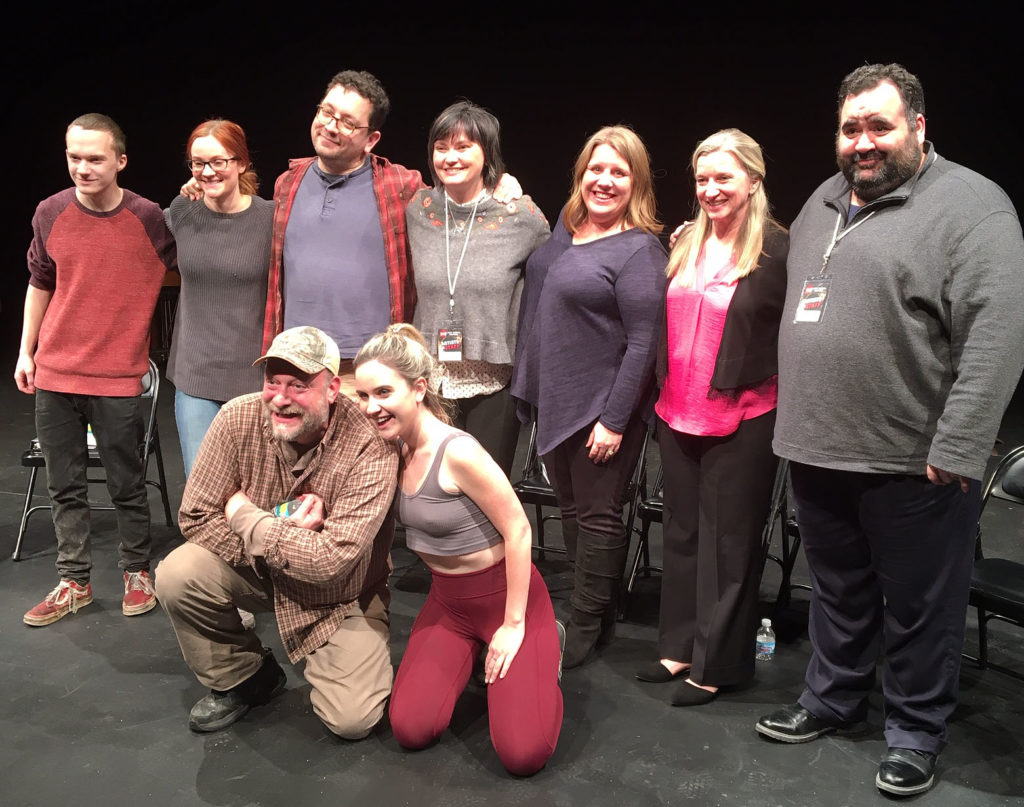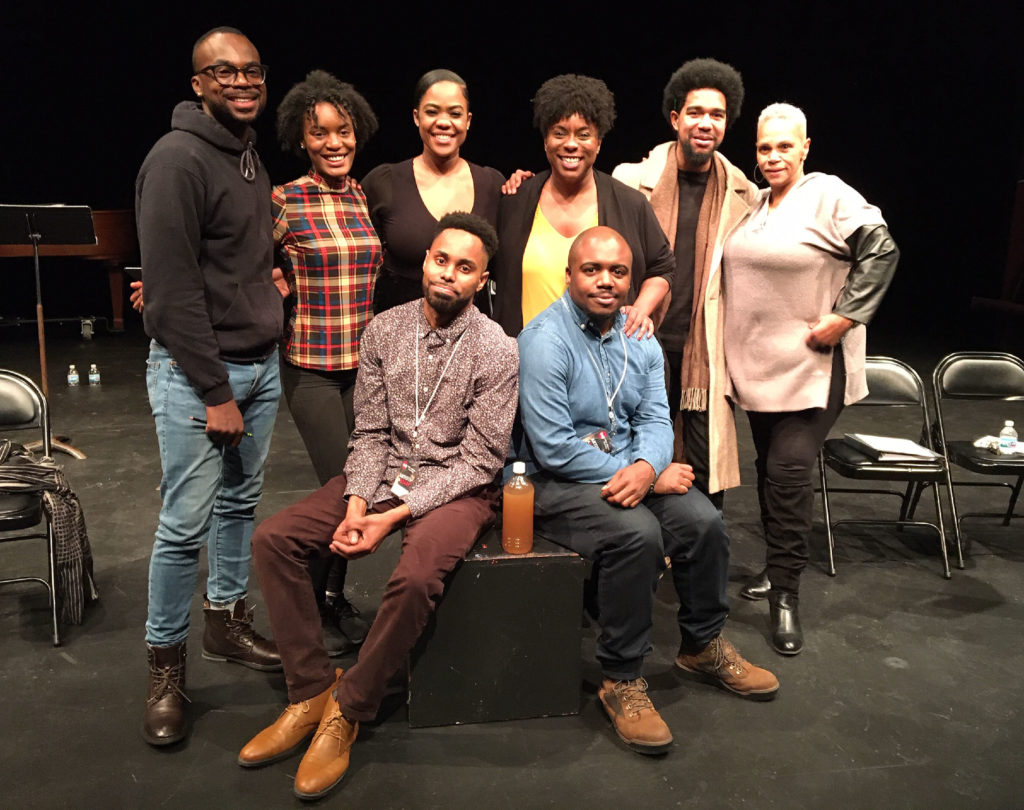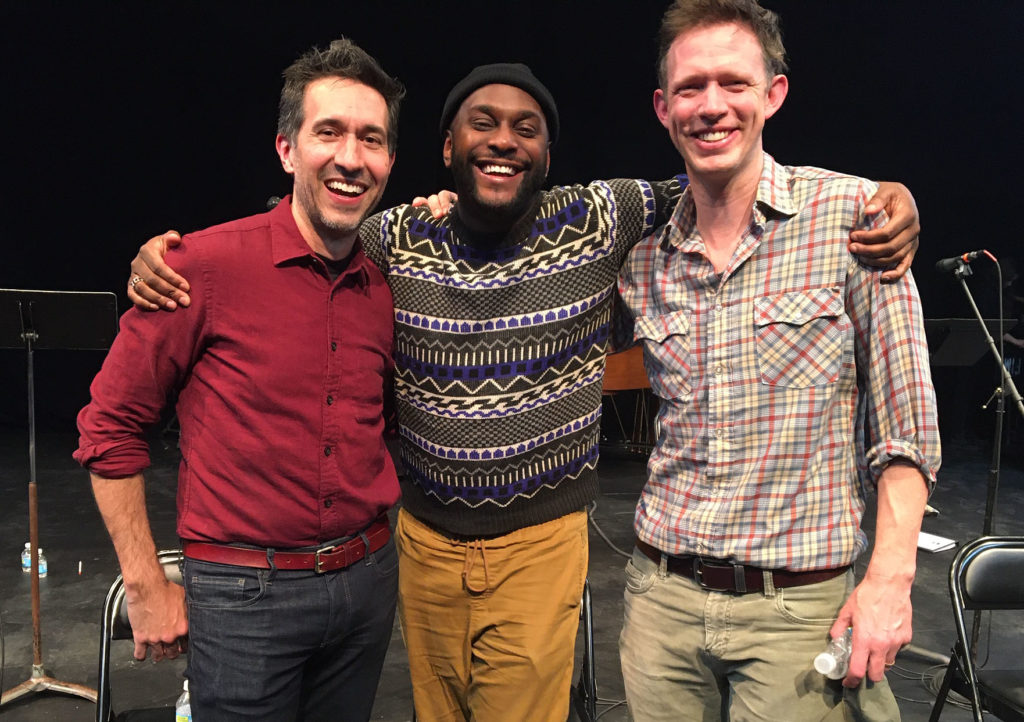By Patsy Isenberg
Bowhunting, autism, the Flint water crisis, and a love story triggered by a celestial event all made dramatic appearances in four plays-in-process offered to Flint theatre goers Jan. 17-19 when for the third year in a row. the Flint Repertory Theatre presented its New Works Festival.
The event showcases new plays still in development. The playwrights, song writers and directors come from around the country, and work with local professional actors who read the plays sitting on folding chairs on a bare stage in the Elgood Theatre at The Rep.
This is a different way to see theatre. It’s impressive that a group of people can pull together, learning the songs and lines in such a short time and present to an intimate audience — which varied this year between 30 and 55 — for entertainment and as an interesting thespian challenge, as the plays, actually, are still being written.
The New Works Festival is a success for The Rep, according to Michael Lluberes, artistic director for “The Rep,” adding that it’s his “favorite thing” the theatre does and predicting it will most likely continue next January for the fourth annual festival.
Lluberes chooses new works from numerous submissions, casts the roles, oversees quick rehearsals, and sells $10 tickets to an audience for feedback. This year two musicals and two regular plays were presented: “Talk to Me” a musical, on Friday night; the two straight plays, “Quiver” and “Wrong River,” on Saturday: and the final musical, “The Moon and the Sea,” on Sunday night.
Immediately after the each reading Lluberes gathered the cast, the director and musical talent on stage to talk about their processes, what inspired them, how long it took, what their plans or hopes for the plays are, etc. Then they took questions and comments from the audience members, many who are theatre “geeks” who braved that weekend’s blast of winter weather and record-breaking snowfall.
One musical read at last year’s New Works Festival, “The Magnificent Seven,” is in production at The Rep right now and will open there May 1. This can happen. Playwrights often travel to other theatre readings like The Rep’s in other cities and sometimes get offers to produce them.
For the playwrights, that’s just one advantage, along with the audience feedback and hearing their own works read and directed. The process often moves the plays to the next level. Sometimes they’re changing lines, adding scenes or even new songs during the rehearsal. The creators of the works want to observe audience reactions in order to be sure their message is coming across as they envision it.
“Talk to Me”: a young boy’s struggle to fit in
The first one, “Talk to Me” by Charlie Sohne, is about Graham, a middle school boy on the autism spectrum. His mother, younger brother, and classmates lives are altered through their relationships with Graham. Graham is a very bright boy and is shown tormented by trying to fit in and communicate with the people around him often not being able to process what he’s experiencing. The difficulties his single mother (read by Beth Guest) has in trying to both work at a job and spread time between her two sons is well-illustrated.

Left: Charlie Sohne, right: Tim Rosser (Photo by Patsy Isenberg)
The younger brother (read by Sam Sommer) is often tasked at school with “keeping his eye” on his brother and making sure he doesn’t melt down too badly. A couple of these meltdowns are shown during the play. Gage Webster does a fantastic job reading (and singing) the part.
Webster was recently seen in The Rep’s “Into the Woods” as a rope-climbing Jack of “Beanstalk” fame. Frenetic piano music during these meltdowns by Casey Baker helped to convey how it might feel for someone with autism.
All of the characters sing songs written by Sohne’s longtime writing partner, Tim Rosser, both from New York. About their writing process, Rosser explained the team’s writing “We’ve tried lots of different ways… these days we start with the script… and then we will pick our favorite moment, what we think is the most exciting moment of the show and then we talk at length about what needs to happen over the course of the song and how it should play out… and then I will go away and basically write the whole thing and kind of orchestrate it too.” All of this happens before the lyrics.
“Talk to Me” was directed by Anthony Guest and the other characters were read by Madison Wiley (as a super smart classmate), Stanley Misevich (as a struggling classmate) and Liz Jaffe (the voice of Siri).
This was the only work presented that weekend that didn’t feature an aspect of “magical realism,” defined in dictionary.com as “a style of painting and literature in which fantastic or imaginary and often unsettling images or events are depicted in a sharply detailed, realistic manner.”
“Quiver”: a Michigan story
Bow hunting is the theme of “Quiver,” the first play on Saturday, Written by Jenni Lamb, who’s based in Chicago, and directed by Sonja Marquis, the action and “message” in this work centers not just around bow hunting but also family relationships. Brother and sister twins (Diane, read by Destiny Dunn; and Adam, read by Joe Zarrow), who’ve bow hunted all their lives, meet one week at Diane’s home in northern Michigan for a planned hunting reunion from their youth.

Back, (l-r) Matthew Cremeans, Destiny Dunn, Joe Zarrow, Jenni Lamb, Sonja Marquis, Amy Morrisey, and Michael Lluberes. Front, (l-r) Mark Gmazel and Meredith Deighton (Photo by Patsy Isenberg)
Problems arise however when Adam’s 15-year-old daughter, Pearl (read by Meredith Deighton), is brought by her mother Cassie (read by Amy Morrisey). Pearl is a vegan/vegetarian, hates the idea of killing animals, and was just kicked out of school for drinking. Cassie can’t stay because of her job and Adam, to his great dismay, is left to deal with the unruly teenager.
Neighbor Jimmy (read by Mark Gmazel) and his nephew Troy (read by Matthew Cremeans) hang around and eventually an understanding between the girl and her dad is reached. The magical realism occurs when a young fawn (read by Cremeans) and big buck (read by Gmazel) talk and interact with some of the humans.
As playwright Lamb explained, this is a technicality to still be worked out if the play hits the stage. “I just think there’s so much that can be done,” she said, “like really engulfing the audience in the forest.” At the reading some of that was accomplished through sound effects.
Addressing the division of people being for or against hunting Lamb, who said she grew up in a family of hunters, described her own conflict and resolution about this issue. “This is something that has always been part of my life… I feel like I’ve had different feelings about it … I used to be very grossed out by it, but as I’ve gotten older I realize… where meat comes from, and that this is no different than what farmers do.”
“Wrong River”: A Flint water crisis drama
Later Saturday evening featured “Wrong River,” written by Philadelphian, Josh Wilder. “Wrong River” made the Flint audience sit up and take notice. College student Wilder said he had been reading the news about Flint’s water crisis and in discussions with colleagues brought up the idea of writing a play about it. He said he couldn’t put this idea to rest.
“The summer of 2016 I came to Flint and got to contact the head of public health at The University of Michigan-Flint and was invited to the Broome Center for a community activist meeting and actually got a chance to ask permission from the people of Flint to write the story. And I wouldn’t do that without their blessing.”

Back, (l-r): Mike Sandusky, Curr’esha Beatty, Erika Franklin, Kelli Crump, Jon Kent Ethridge, and Madelyn Porter. Front, (l-r) Jeremiah Davison and Josh Wilder (Photo by Patsy Isenberg)
He said he still felt something was missing after writing the play, so he returned to Flint a second time to “feel comfortable enough to tell this story.”
Later Wilder met director Jeremiah Davison in Atlanta who said to Wilder, “Hey you’ve got a play about Flint … well, I’m from Flint.” When the play was accepted for the festival, Davison came on board to direct and Wilder expressed gratitude for Davison’s “insight.”
“Wrong River” centers around a somewhat dysfunctional and struggling black family trying to cope with the sudden worry over the family’s health problems from drinking the water and financial strain experienced by father, Vick (read by Mike Sandusky) who steals a case of expensive FIJI water from his job at Walmart.
The friction created between Vick, his wife Leah (read by Erika Franklin), and his sister-in-law, Lisa (read by Kelli Crump) becomes intense. Vick’s best friend, Danté (read by Jon Kent Ethridge) who’s around a lot and tries to help keep peace in the family, gives Vick a hard time about taking the water. Vick and Leah’s young daughter Dayla (read by Curr’esha Beatty) is suffering from a serious skin rash and has begun “communicating” with her dead grandmother June (read by Madelyn Porter–seen late last year in “The Effect of Gamma Rays on the Man-in-the-Moon Marigolds.”)
June apparently died from Legionnaire’s disease which she contracted through the contaminated water. Many of their issues overlap and become bad enough to split up the family. In this play the magical realism comes with the appearance of the “ghost” of June, attempts by June and Dayla to “cap” the Flint water tower and travel in a “water bottle” boat down the Flint River eventually trying to get to Fiji Island. “Wrong River” begins with a “flashback” (as it’s later understood to be) of June addressing Flint City Council angrily demanding help and solutions to the water crisis, naming one actual councilperson, Eric Mays, directly.
“The Moon and the Sea”: a musical and love triangle
The final reading on Sunday evening was of “The Moon and the Sea.” The book for this musical was written by Douglas Lyons with music and lyrics by Creighton Irons, directed by partner, Josh Rhodes. Both playwrights are from New York. The musical is at its core a love story.

Left to right, Josh Rhodes, Douglas Lyons, and Creighton Irons (Photo by Patsy Isenberg)
In the beginning, musician team Charlie (read by Scott Anthony Joy) and Erin (Mary Paige Rieffel) are at the shore one evening mesmerized by a surprise celestial event that sometimes occurs where the moon and sea become one, creating a silvery light. The two begin to dance and kiss. Joy played Lee Harvey Oswald and Rieffel played Lynette “Squeaky” Fromme in last year’s “Assassins.” It turns out that Charlie had meant to propose to Erin that night but was swept up and distracted by “the miracle” they witnessed. Charlie takes a lot of ribbing from his loud and funny roommate Elijah (read by Joshua M. Cornea) for still not having asked her to marry him. One thing leads to another, an attempt to propose at one of their gigs, Charlie’s mother’s (read by Farrell Sloan Tatum) interference, and more.
Four years pass and their romance becomes a messy triangle. The musical includes songs by two non-human characters, the moon and the sea. Sea is read (and sung) by Jason Briggs who has been in many Rep productions including “Assassins.” Moon by Tatum in another of her three roles in the reading. The moon and sea songs are very “operatic” and quite a contrast to the other music. Tatum and Briggs sing beautifully. The fact that these are characters in the musical is the magical realism in this one. The musical is funny as well as dramatic.
There was a lot of discussion afterward about how the audience sees a triangle (including the ending) and whether it was believable. Some audience members offered their own experiences in situations like this. The playwrights said there is still writing being done. Director Josh Rhodes, was already acquainted with the authors and is continuing to be quite involved in its development which is moving very fast and they have more readings to do and are even thinking about set design. The three are collaborating equally and said they are excited at its promise.
Music direction for “The Moon and the Sea” was provided by Brian Buckner. Casey Baker did the music direction for “Talk to Me,” and Claudia Hicks provided technical direction for all three readings.
The New Works Festival 2020 was sponsored by Amy and Dennis Maloney, David and Joanne Wood and the Whiting Foundation.
EVM Staff Writer Patsy Isenberg can be reached at pisenber@gmail.com


You must be logged in to post a comment.